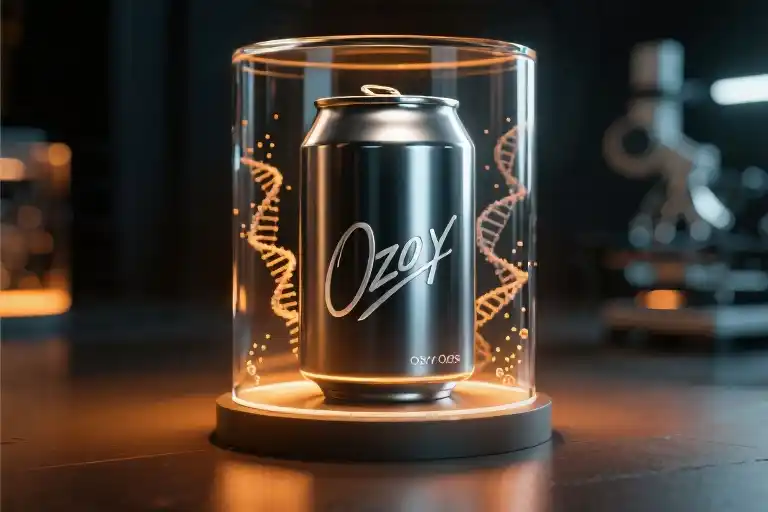On June 17, 2025, ten empty cans containing traces of Ozzy Osbourne’s saliva sold out in minutes at $450 apiece. The product, dubbed Infinitely Recyclable Ozzy, wasn’t just another celebrity merch drop—it was Liquid Death’s audacious experiment at the intersection of viral marketing, fan culture, and speculative science. Picture the scene: the Prince of Darkness himself chugging iced tea from those sleek aluminum cans, scribbling his signature, and growling his now-iconic tagline: “Clone me, you bastards!” before the DNA-laced containers were encased in glass like holy relics.
What made this campaign work wasn’t just Ozzy’s legendary status—it was the deliberate collision of seemingly incompatible ideas. Take the product name: Infinitely Recyclable nods to environmental consciousness, while the subtext (cloning a rock icon from his spit) leans into sci-fi absurdity. Liquid Death didn’t sell water that day; they sold a conversation piece wrapped in inside jokes for metalheads and marketing nerds alike.
The science angle adds another layer. Ozzy’s DNA has fascinated researchers for years—his ability to survive decades of substance abuse earned him the nickname The Man Who Wouldn’t Die in medical journals. When scientists sequenced his genome, they found mutations that helped his liver metabolize toxins like a vintage muscle car burning cheap gasoline. That biological notoriety turned his saliva into something stranger than a celebrity autograph: a biological artifact with cult status.
But here’s the real marketing genius: Liquid Death treated DNA as the ultimate limited-edition flex. Unlike concert posters or signed guitars, these cans claimed to hold the literal building blocks of Ozzy’s existence—or at least enough genetic material to fuel cloning fantasies. It’s collectible culture pushed to its logical extreme, where fandom isn’t about owning something your idol touched, but something that was your idol.
The ethical questions practically write themselves (should we commodify human biology? Is cloning the new merch table?), but that’s precisely why the campaign exploded. Every aspect—from the clinical glass display case to the cheeky “may contain Ozzy’s mitochondria” disclaimer—was engineered to blur lines between joke, commodity, and cultural moment. In the end, those $450 cans weren’t just containers; they were mirrors reflecting how far we’ll go to own a piece of the myths we love.
Why Would Anyone Pay $450 for Spit in a Can?
The morning of June 17, 2025 started like any other day in e-commerce – until Liquid Death dropped ten autographed cans containing traces of Ozzy Osbourne’s DNA. Within minutes, all ten ‘Infinitely Recyclable Ozzy’ units sold at $450 each, proving once again that in marketing, the only limit is imagination (and apparently, what people will pay for rock star saliva).
Each can came encased in museum-grade glass with a certificate of authenticity confirming two things: 1) Ozzy had indeed drunk from this very can of iced tea, and 2) his genetic material could theoretically be extracted from the residual spit. The product description cheekily suggested collectors were purchasing ‘the world’s first celebrity cloning starter kit’ – complete with Ozzy’s own endorsement: ‘Clone me, you bastards!’
Secondary markets went berserk. Within hours, eBay listings appeared with asking prices reaching $2,000, accompanied by creative listings like ‘Ozzy DNA – perfect gift for mad scientists!’ and ‘More metal than your grandma’s hip replacement!’ Fan forums erupted with debates about whether this constituted the ultimate collectible or just corporate trolling at its finest. One Reddit user perhaps put it best: ‘I’ve bought concert tickets, vinyl, even used guitar picks – but owning a piece of his actual biology? That’s next-level fandom.’
What made this campaign work wasn’t just the shock value – though watching grown adults bid on saliva certainly delivered that. Liquid Death executed a perfect trifecta of marketing alchemy: taking something universally considered worthless (empty cans), combining it with something priceless (celebrity DNA), and wrapping it in just enough scientific plausibility to make the absurd seem momentarily reasonable. The glass display case transformed biological waste into a relic; the cloning premise turned a gag into speculative futurism.
Collectors weren’t just purchasing a can – they were buying into the mythology of Ozzy as the indestructible rock icon whose very biology defies norms. When your subject once bit the head off a bat on stage, somehow selling his genetic material feels… oddly on brand.
The Genetic Enigma of Ozzy Osbourne
Ozzy Osbourne’s DNA isn’t just rockstar memorabilia – it’s a scientific curiosity that’s fascinated researchers for decades. While Liquid Death’s marketing team saw dollar signs in those saliva traces, geneticists see something far more intriguing: a biological blueprint that defies conventional understanding of human resilience.
His genetic makeup reads like a medical mystery novel. Where most people’s systems would collapse under the legendary substance abuse, Ozzy’s biology performed like a roadie who’s seen it all and keeps the show running. Studies have identified unusual variations in genes related to dopamine regulation and liver metabolism – the kind that would make pharmacologists raise an eyebrow.
Imagine genes that process toxins with the efficiency of a veteran bartender during last call. That’s essentially what researchers found when examining how his system handles substances that would hospitalize others. His ADH4 gene variant, sometimes called the ‘heavy metal gene,’ encodes enzymes that break down alcohol nearly 40 times faster than average.
But here’s where science meets marketing genius: these very mutations that kept Ozzy alive through decades of excess became the selling point for those $450 cans. The product wasn’t just peddling celebrity spit – it was packaging scientific notoriety. That glass-encased can represents the intersection of pop culture and cutting-edge genetics, where a rockstar’s biological quirks transform into collectible commodities.
What makes this DNA particularly marketable isn’t just its celebrity source, but its documented scientific value. Peer-reviewed studies have examined Ozzy’s genome alongside other ‘outlier’ individuals who survived extreme substance exposure. Researchers jokingly refer to this category as ‘the Ozzy cohort’ – people whose biological resilience seems to laugh in the face of conventional medical wisdom.
Yet for all our understanding, there’s still something wonderfully inexplicable about how these genetic variations interact. Science can identify the unusual gene variants, but can’t fully explain how they create someone who could snort a line of ants (true story) and live to tour another year. That lingering mystery makes Ozzy’s DNA the perfect marketing artifact – equal parts scientific specimen and rock mythology.
When Liquid Death decided to sell those DNA-laced cans, they weren’t just banking on celebrity worship. They tapped into our cultural fascination with biological exceptionalism – the same impulse that makes us stare at circus freaks and Olympic athletes. Only in this case, the spectacle came with a certificate of authenticity and a 450-dollar price tag.
The Marketing Alchemy: Turning Spit into Gold
Liquid Death’s $450 saliva cans didn’t just sell – they evaporated from virtual shelves in minutes. This wasn’t accidental success but a masterclass in modern marketing alchemy, where three primal elements combined to create commercial lightning.
Collision of Opposites
The genius lies in the calculated dissonance. A brand built on environmental consciousness (canned water to reduce plastic) peddling celebrity DNA specimens. The ‘Infinitely Recyclable Ozzy’ name itself winks at this tension – suggesting ecological responsibility while dangling sci-fi cloning fantasies. This cognitive friction forces attention, making bystanders stop and ask: Wait, is this serious?
Manufactured Scarcity
Ten cans. Not nine, not eleven. The precise scarcity calculus made each unit a trophy. By limiting supply to single digits and adding unique identifiers (that glass prison for Ozzy’s genetic remnants), they transformed commodity into relic. The secondary market response proved the strategy – almost immediate eBay listings at 300% markup, not for functional goods but for empty vessels containing what marketers now call ‘biocontent.’
The Instagram Effect
Every $450 purchase came with built-in bragging rights optimized for social platforms. The product design anticipated its role as photographic prop – the laboratory-style glass enclosure visually distinct from typical merch, the cheeky certificate of authenticity begging to be framed in influencer backdrops. This wasn’t mere consumption but content creation fuel, with buyers becoming brand ambassadors through the simple act of showing off.
Replicable Tactics
Three transferable principles emerge from this campaign:
- Dissonance as Hook: Pair fundamentally incompatible ideas (here: sustainability + celebrity cloning) to create talkable tension
- Precision Scarcity: Extreme limitation (single-digit quantities) outperforms vague ‘limited edition’ claims
- Shareable Physicality: Design products that photograph distinctly and tell their own story visually
The underlying truth? Liquid Death didn’t sell canned DNA – they sold the right to participate in a cultural moment. As one buyer tweeted beside their display case: Finally, a retirement plan for my poor life choices.
The Ethics of Selling DNA: Where Do We Draw the Line?
The sale of Ozzy Osbourne’s saliva-filled cans raises uncomfortable questions we’ve been avoiding since the first celebrity strand of hair sold at auction. When Liquid Death packaged rockstar DNA as a $450 collectible, they didn’t just create viral marketing—they crossed into uncharted ethical territory where biology becomes commerce.
Current cloning technology remains firmly in science fiction territory, despite what the “Infinitely Recyclable Ozzy” campaign playfully suggests. The reality is we’re decades away from synthesizing humans from trace DNA in saliva, if it ever becomes ethically permissible. Yet the mere suggestion of future cloning potential transformed these cans from quirky merch into controversial bio-collectibles.
This isn’t about Ozzy specifically—Elvis Presley’s hair regularly fetches five figures at auction, and a lock of Abraham Lincoln’s blood-stained hair sold for $81,000 in 2022. The difference? Those were posthumous artifacts, not products deliberately created to commodify living human biology. Liquid Death’s campaign represents the logical extreme of celebrity endorsement, where the endorsement isn’t just a face or name, but actual genetic material.
The uncomfortable truth is we’ve been conditioning ourselves for this moment. From celebrity skincare lines using star DNA (like Grace Beauty’s “Famous Faces” serum) to companies offering to store your pet’s DNA for future cloning (per PerPETuate’s $1,600 service), we’ve normalized the idea that biology can be bottled and sold. The difference here is the marketing framing—instead of medical or sentimental value, Ozzy’s DNA is sold as an inside joke between brand and consumer.
Where does this leave fans? The same people who once bought concert tees now face existential questions: Is owning celebrity DNA the ultimate form of fandom, or does it cross into something more unsettling? Social media reactions revealed the divide—some called it “the most metal merch ever,” while others compared it to “buying someone’s soul in a mason jar.”
Perhaps the most revealing aspect was the secondary market behavior. Within hours, resellers listed the cans for over $2,000, proving that even in hypothetical cloning scenarios, capitalism finds a way. This raises darker questions: If we commodify DNA today for novelty, what prevents creating genetic black markets tomorrow? The European Union’s General Data Protection Regulation already treats genetic data as sensitive personal information—should celebrity DNA receive the same protections?
The conversation inevitably turns to consent. Ozzy famously shouted “Clone me, you bastards!” in the promotional video, but how many celebrities truly understand the long-term implications of commercializing their biological material? Unlike image rights which expire, DNA is the ultimate perpetual license—your cells could theoretically be cultured indefinitely without your continued permission.
Before you answer whether you’d buy a loved one’s DNA, consider this: We’ve entered an era where your great-grandchildren might one day browse celebrity genome auctions the way we browse vintage record collections. The question isn’t whether Ozzy’s cans were cool marketing—they undeniably were—but whether we want to live in a world where biology becomes just another limited edition drop.
When Products Become Cultural Artifacts
The $450 saliva cans sold out in minutes, but what lingers isn’t just Ozzy Osbourne’s DNA—it’s the uncomfortable truth about modern consumption. We’ve crossed into an era where marketing doesn’t just sell products; it sells cultural participation. That glass-encased can isn’t a beverage container anymore; it’s a membership card to an exclusive club that whispers: You get the joke.
Liquid Death’s stunt works because it weaponizes three unspoken rules of our time:
- Scarcity is the new luxury (10 cans = 10 golden tickets)
- Biological matter is the ultimate autograph (Your poster fades; DNA lasts forever)
- Ethical ambiguity is a feature, not a bug (‘Should we clone Ozzy?’ is better engagement bait than ‘Buy our tea’)
What fascinates me isn’t the science—we’ve known about celebrity DNA auctions since 2013 when someone tried selling Justin Bieber’s hair follicles—but how casually we’ve accepted that bodies can be merchandise. The same generation that boycotted blood diamonds queues up to own rockstar spit. We’ve been conditioned to see everything, even human biology, through the lens of collectible potential.
Yet there’s poetry in this absurdity. That can represents marketing’s final frontier: when the story around an object becomes more valuable than the object itself. The aluminum isn’t special. The tea wasn’t extraordinary. But the narrative—that this might someday resurrect the Prince of Darkness—transforms trash into treasure.
So here’s the real question they’ve smuggled into this stunt: In a world where we’ll pay $450 for hypothetical cloning rights, what won’t we commodify? Your answer probably says more about our culture than any DNA test ever could.
Drop your truth below: Would you rather own a piece of your hero’s biology, or keep the boundary between fandom and forensic evidence intact?





